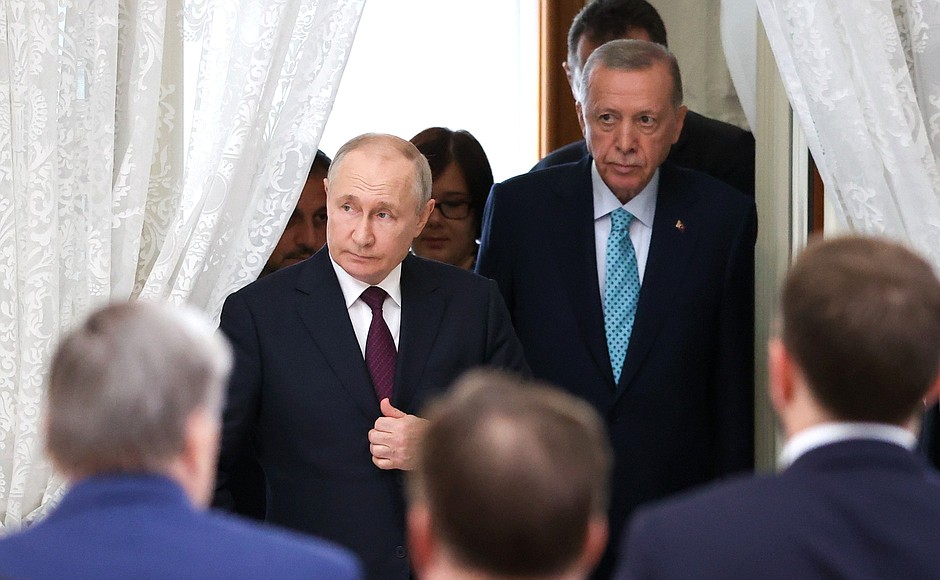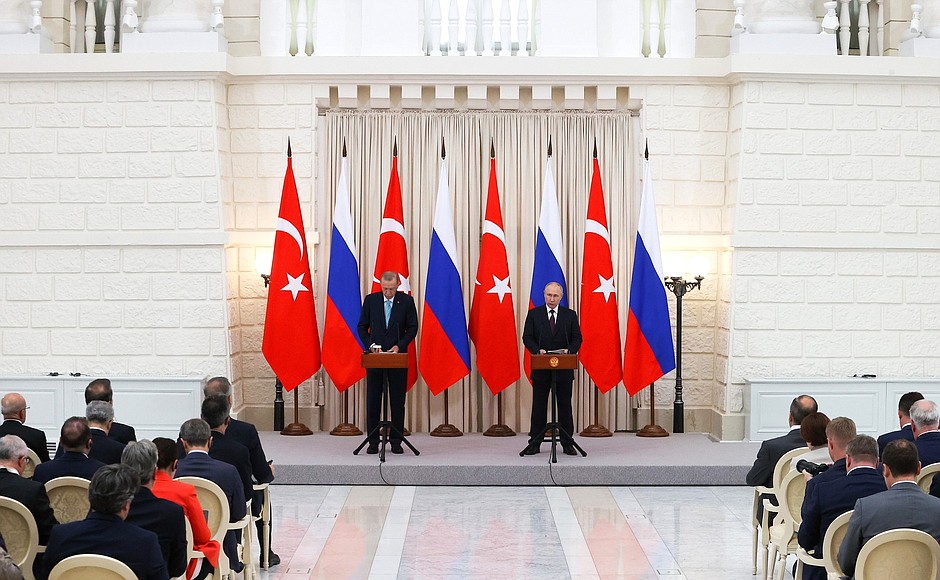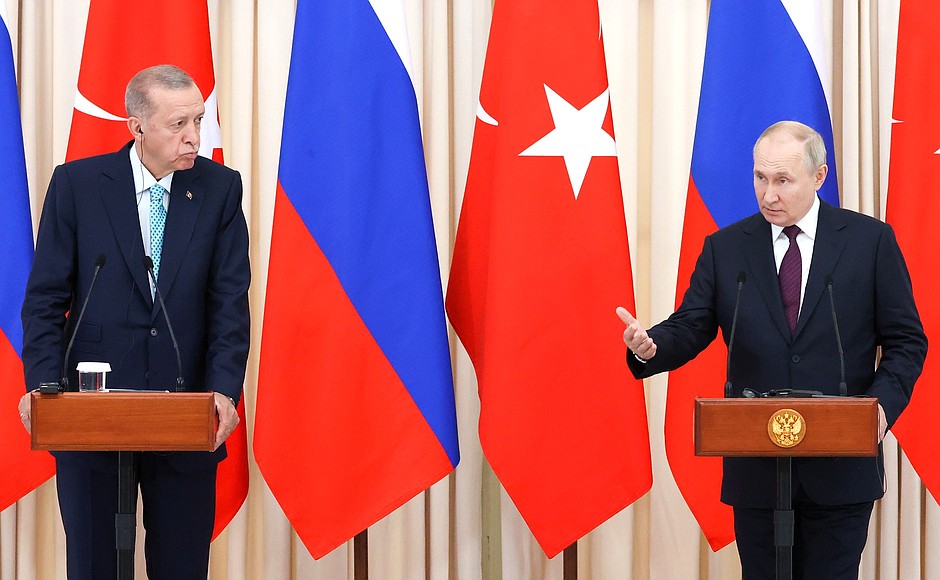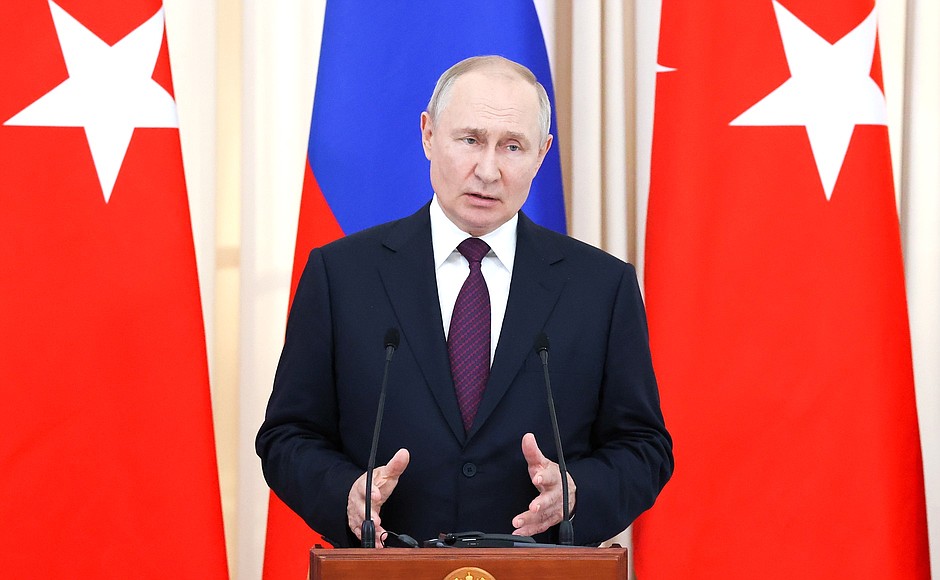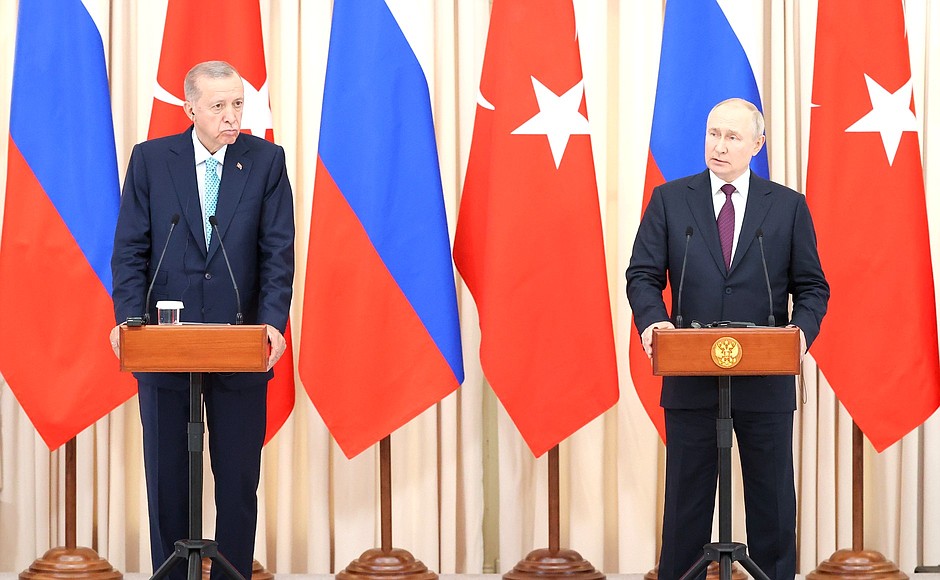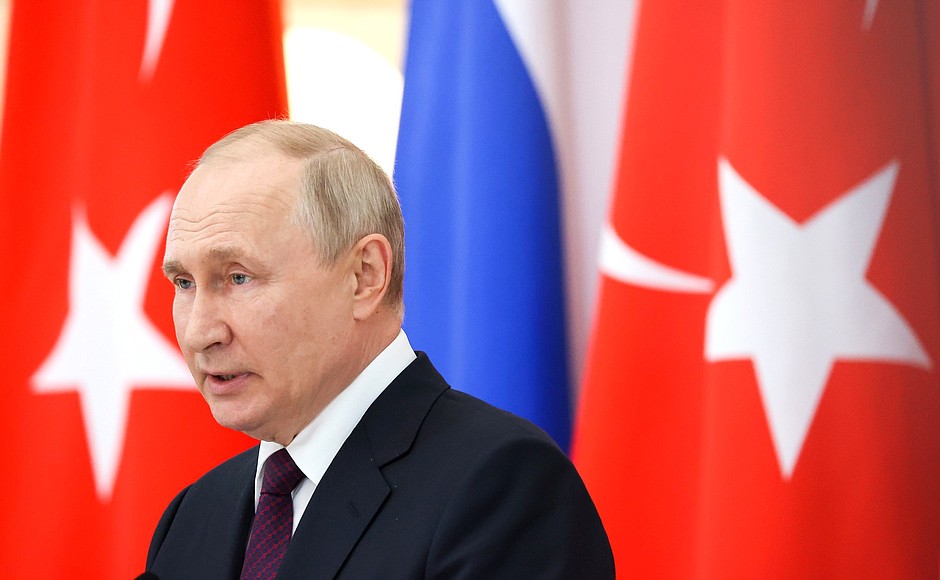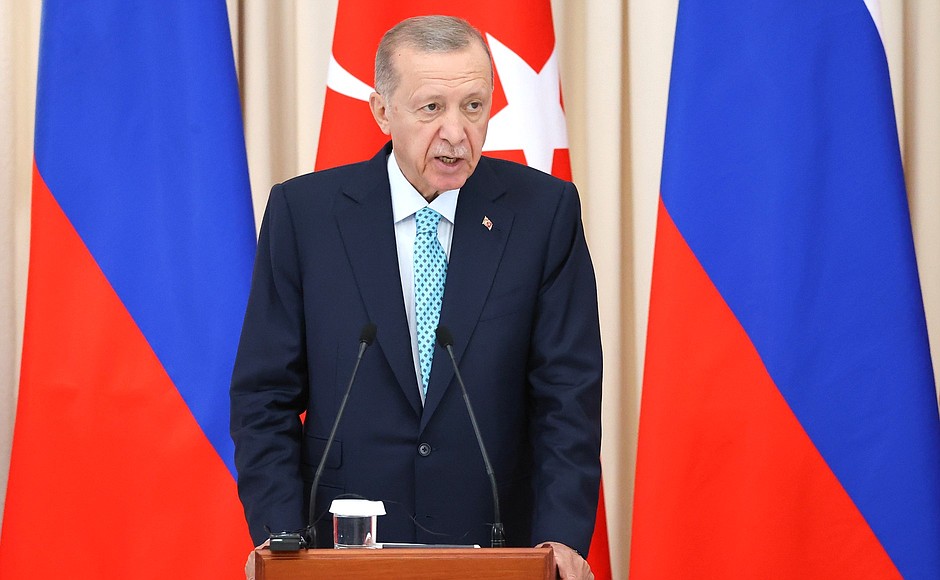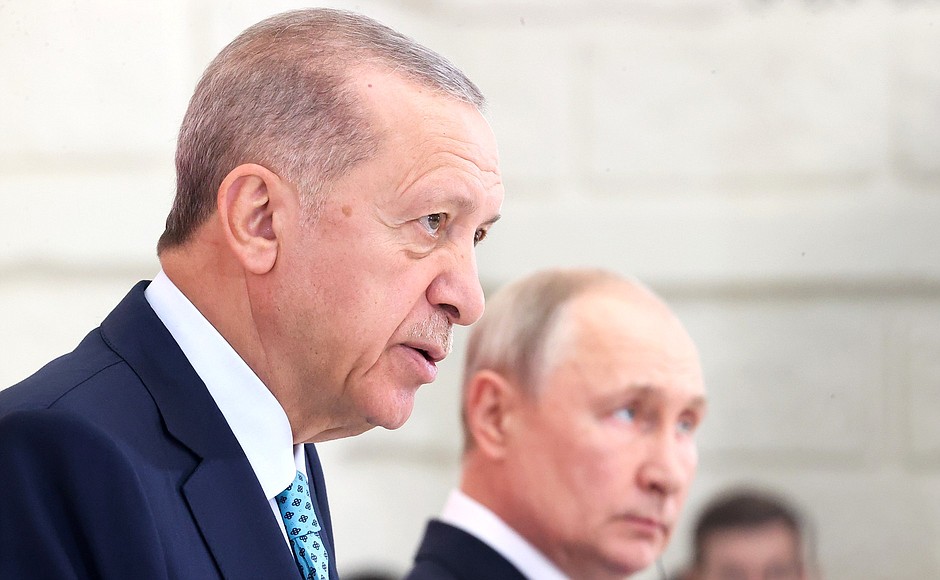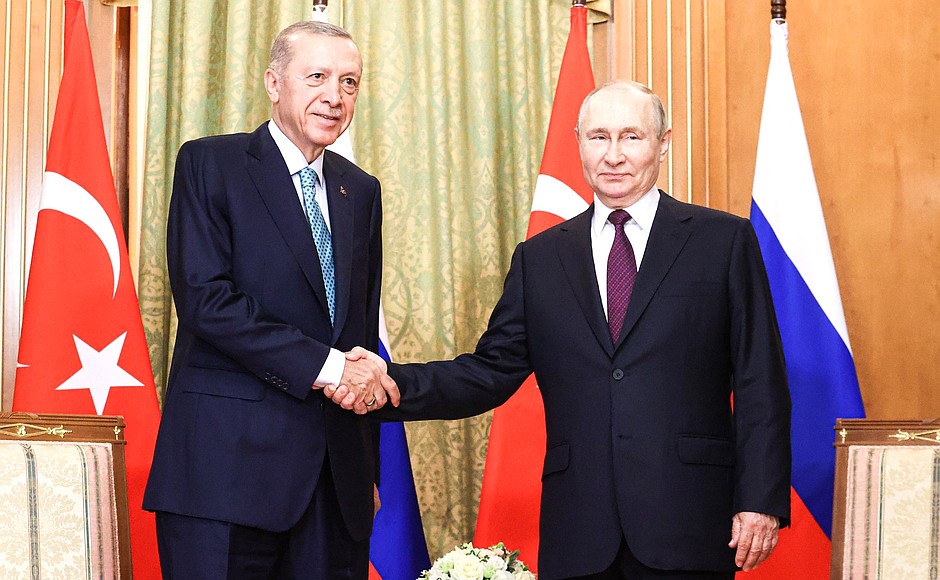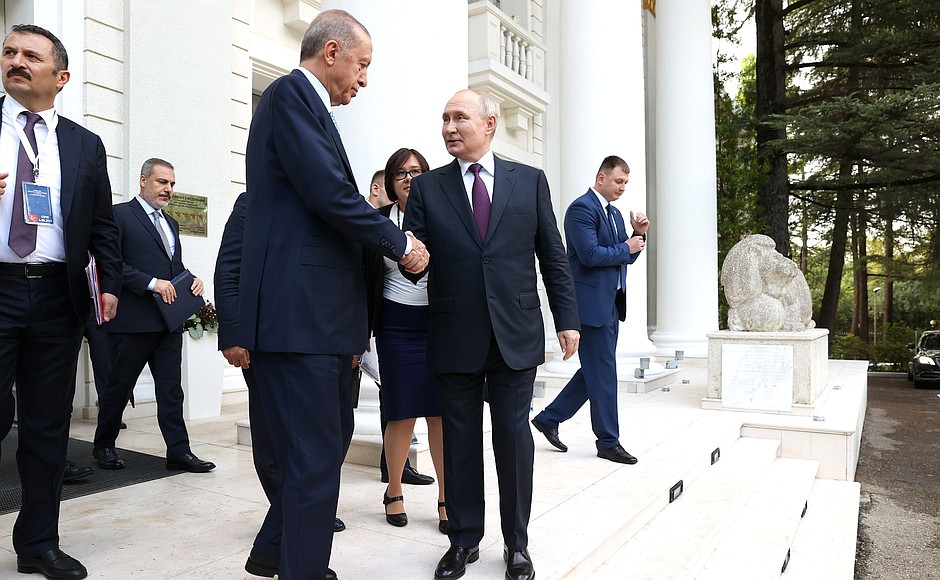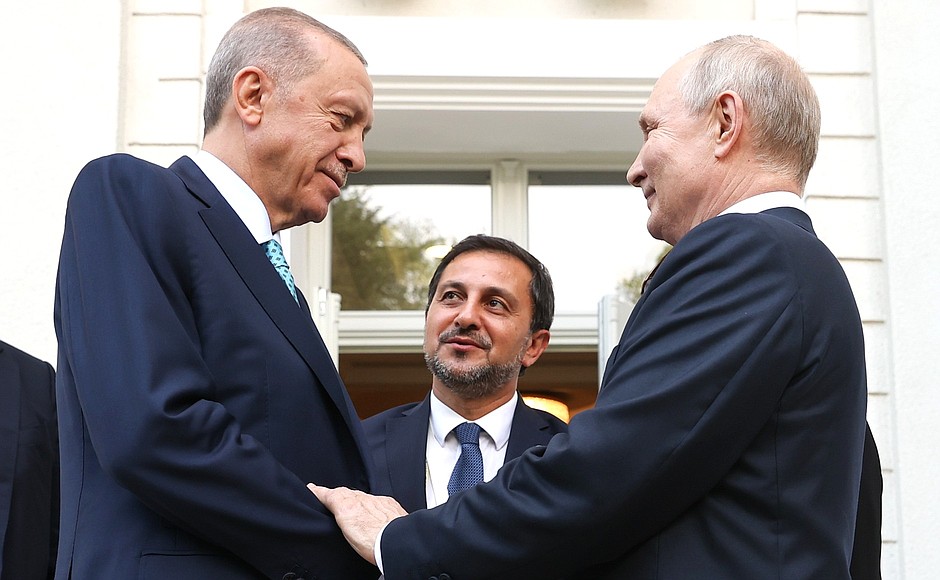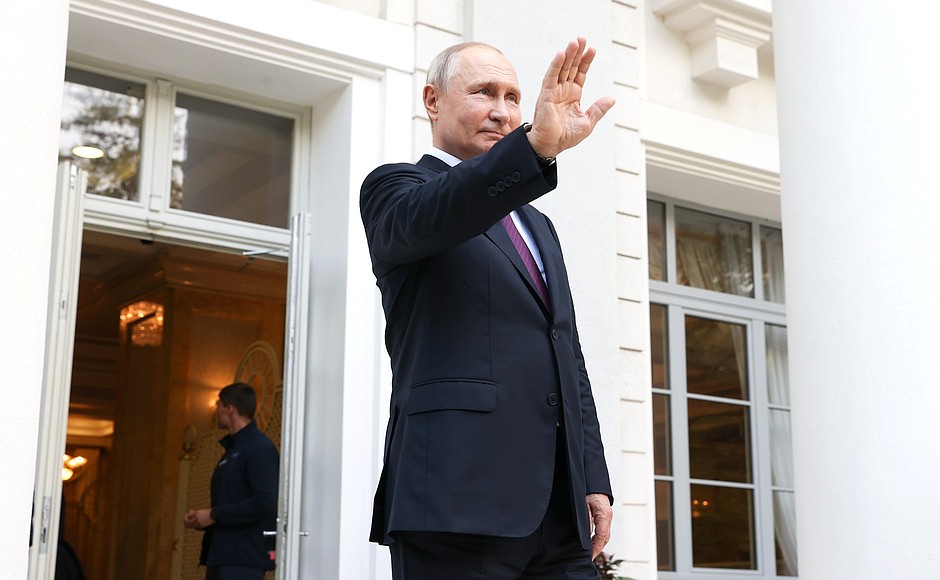President of Russia Vladimir Putin: Mr President, ladies and gentlemen,
We are pleased to welcome the President of Turkiye to Russia once again.
I want to note that Russia-Turkiye multifaceted cooperation, which is based on neighbourliness, partnership and mutual benefit, is successfully developing across all areas.
See also
As always, today's talks took place in a constructive and business-like atmosphere. We have reviewed in detail the key aspects of Russian-Turkish cooperation in security, the economy, politics, culture and the humanitarian sphere and have exchanged views on current issues on the international and regional agendas.
During the discussion of bilateral economic ties, we were pleased to note the continued growth of trade. In 2022, it increased by 86 percent and reached a record-breaking 62 billion US dollars, though some estimates give an even bigger figure, while in the first half of this year it increased another 4 percent.
There is a trend towards wider use of national currencies – the ruble and the lira – in trade. Thus, the share of the dollar and the euro in mutual transactions is consistently decreasing. Our respective central banks are working closely to develop a correspondent network between the financial and lending institutions of both countries.
Russian-Turkish cooperation in the energy sector is of a genuinely strategic nature. Rosatom continues to build Turkiye's first nuclear power plant, Akkuyu. It will consist of four power units of Russian design with a total capacity of 4,800 MW. Approximately 25,000 Russian and Turkish nuclear specialists, engineers and technicians are working day and night to ensure that the first power unit is launched next year.
In April, Russian nuclear fuel was sent to Akkuyu, and the nuclear power plant received the official status of a nuclear facility. This status was granted by the IAEA. Thus, Turkiye has joined the club of countries with peaceful nuclear technology.
Our countries also enjoy close interaction in gas supplies. Last year, Russia delivered 21.5 billion cubic metres of gas through the TurkStream and Blue Stream pipelines to Turkiye. In January-August 2023, it delivered over 10 billion cubic metres of gas.
I want to emphasise that Russia has always been and will be a reliable, responsible gas supplier. We will continue to provide the Turkish economy with this cheap but highly efficient and environmentally friendly fuel. Moreover, we are ready to export gas to third countries that are interested in it through Turkiye.
To that end, we have suggested creating a regional gas hub in Turkiye. Gazprom has submitted a draft road map for the project to BOTAS. The plan includes creating a joint working group, agreeing on a legal regulatory framework for hub activity, and developing the processes for the trade and transfer of imported gas.
Russian-Turkish cooperation in agriculture is expanding quickly. Last year, mutual food deliveries reached 7.4 billion US dollars. This year, the growth continues, increasing by 19 percent in January-July.
Naturally, we also discussed the development of tourism. Last year, over 5 million Russian tourists visited Turkiye, with another 2.2 million Russians visiting the country in the first six months of 2023. We hope that this dynamic will be maintained. Our relevant agencies will continue working with the Turkish authorities to make sure that Russian nationals’ time in the country is safe and comfortable. Our Turkish friends are doing everything in their power to that end.
I also want to remind you that Russia has always striven to provide friendship and partnership assistance to Turkiye, including assistance efforts in the aftermath of natural disasters. Soon after the February’s devastating earthquake, our country was one of the first to send rescue and medical units to Turkiye. We also responded promptly to the country’s request to provide the Russian amphibious aircraft Be-200 to fight wildfires on the Aegean Sea coast.
And of course, we paid a lot of attention to current international issues, in particular to the situation around Ukraine. Naturally, we talked about the suspension from July 18 of the Black Sea Initiative on grain exports from Ukrainian ports. Mr President emphasised this.
As I have said many times, we were forced to make this decision – I mean Russia was forced – because the Western countries had blocked the part of fulfilling the grain deal that ensured Russian agricultural products access to global markets. Meaning, they refused to lift the sanctions on the export of our grain and fertiliser, on resuming shipments of agricultural machinery and spare parts to Russia, on removing barriers to logistics and chartering ships, and on banking services and insurance for this shipping.
And while Russia clearly provided security guarantees for shipping under this deal, the other side used humanitarian corridors for terrorist attacks against Russian civilian and military facilities. This could no longer be tolerated.
It is also clear that suspending the deal did not affect the global food market – I would like to highlight this – whatever is said about it. Grain prices continue to decline. There is no physical shortage of food. Yes, there are problems with fair distribution, but this has nothing to do with the grain deal.
We do not see anything surprising in this because, if Ukraine’s share in world grain exports was 5 percent, it remained so, but will naturally decrease in the current conditions.
The West, to put it mildly, deceived us about the humanitarian goals of the Black Sea Grain Initiative, that is, providing assistance to developing countries. Because of the 32.8 million tonnes of cargo exported from Ukraine, over 70 percent – I want to emphasise this again – went to the wealthy countries, primarily to the EU, whereas the share of countries in real need of food aid accounted for only 3 percent, that is, less than one million tonnes.
I would like to reaffirm our principled position: we will be willing to consider the possibility of resuming the grain deal – I said this once again to Mr President today – and will do it immediately, as soon as all the agreements set out in that deal on lifting the restrictions on the export of Russian agricultural produce are fully implemented.
Despite the obstacles, Russia will continue to export food and fertiliser, to contribute to price stabilisation and to improve the situation in global agricultural industry. To this end, we have proposed, among other things, to supply one million tonnes of grain from Russia at a preferential price for processing in Turkiye and then transporting it without cost to the neediest countries.
In this regard, we are also counting on assistance from the State of Qatar which, for humanitarian reasons, is willing to support the countries that are most in need. By the way, we are close to finalising agreements with six African countries on food supplies free of charge and even offer free shipping. The talks are almost complete, and shipping will start in the next couple of weeks.
During the talks, we discussed the Syrian settlement as well. We highly value our cooperation with the Republic of Turkiye in this sphere. In particular, we are interacting constructively within the Astana format, which is currently the most effective mechanism for international consultations on Syria.
Importantly, we share fundamental approaches to resolving the Syria crisis, including respect for its sovereignty, independence and territorial integrity. We understand that before we can deploy efforts on the comprehensive recovery of Syria, national reconciliation and accord must be achieved. We believe that the Syrians themselves should determine the future of Syria without any ready-made solutions or models imposed on them from outside.
When exchanging views on the situation in Libya, we reaffirmed our commitment to a comprehensive settlement of the long-standing crisis in that country through negotiation and a search for compromise solutions, while avoiding outbreaks of violence and preventing the disintegration of the Libyan state.
Overall, I believe that the meeting to compare notes on the above and other regional issues was quite productive.
To sum up, I would like to once again express my gratitude to President of Turkiye Recep Tayyip Erdogan for our joint work, and for the substantive and productive dialogue. Without a doubt, today's talks will further promote the Russian-Turkish partnership in all areas.
Thank you.
President of the Republic of Turkiye Recep Tayyip Erdogan (retranslated): Mr President, members of the delegations, media representatives,
I warmly and respectfully welcome all of you.
Once again, I would like to express my gratitude to Mr Putin for his kind invitation. I would also like to take this opportunity to thank Russia for the support it provided during the earthquake that occurred on February 6 and during the wildfires. I would like to express my gratitude for this support.
The last time I met with Mr Putin in person was in Astana during the Conference on Interaction and Confidence-Building Measures in Asia. Since then, we have been in close contact through telephone conversations.
Today, we had both a one-on-one meeting and a meeting with participation of our delegations. We assessed the steps that can be taken to further strengthen our multifaceted cooperation, especially in the areas of trade, energy, agriculture and tourism.
Last year, trade between our countries reached 69 billion US dollars. I want to emphasise that we are confidently moving towards the 100-billion-dollar mark.
Last year, 5.2 million Russian tourists visited our country, and in the first seven months of this year, 3.5 million Russian tourists have visited our country. I believe that this number will increase in the remaining five months of this year.
The Black Sea Initiative. We are pleased that Russia is opening an office in the Turkish Republic of Northern Cyprus.
I believe that Russia, and particularly the Black Sea Initiative, has played a key role for the poorest countries. This initiative has been like a lifeline for the poorest countries.
The alternative proposals placed on the agenda did not meet expectations in terms of security and other aspects. Our Russian friends have made clear their expectations in this regard, and we emphasise these expectations at different platforms.
I shared with my colleague and my friend that we are ready to hold such consultations. We will prepare a new package of consultations with the UN. I believe that we will be able to achieve results in this regard. Turkiye will make every effort in this regard, and we believe that we will achieve a result on this deal in the shortest time possible.
Media representatives,
We do everything we can to establish lasting peace and stability in our region. In every speech, I emphasise that there are no winners in war, and there are no losers in peace. We adhere to this principled approach. Earlier, we held direct negotiations between the parties; as always, we are ready to contribute to this.
Mr Putin and I discussed other regional and global issues as well. In this regard, we assessed the developments in Syria, the South Caucasus, Libya and Africa.
We are developing bilateral relations based on the principles of neighbourliness, friendship and sincerity, aiming to serve the interests of our countries and our region. We have observed and continue to observe, and we see the benefits of Turkish-Russian relations built on this foundation in a wide space. Our close contacts with Russia will continue to contribute to resolving regional and global issues.
I especially want to mention the Akkuyu Nuclear Power Plant. As you know, construction is underway. I would like to highlight the second step in this area: in Turkiye, in the city of Sinop, we discussed the construction of a second nuclear power plant with my dear friend. With this step, Turkiye will undoubtedly break new ground.
In closing, I would like to once again thank Mr Putin for the hospitality he extended to my delegation and to me. I hope my visit will be beneficial to our countries and the region.
Presidential Press Secretary Dmitry Peskov: Turkish and Russian journalists can now ask one question each.
Let us start with our guests. Turkish journalists, please go ahead.
Ali Jura (retranslated): Ali Jura, Anadolu Agency.
A question for both presidents. President Erdogan mentioned that significant diplomatic efforts were being made in the Russia-Ukraine conflict. During this meeting, was there any discussion of a ceasefire or sitting down for talks?
(In Russian.) Mr Putin, I have a question for you in Russian. How important is it to continue the Black Sea Initiative for Russia and the Black Sea region? Do you believe it should be continued?
Thank you.
Vladimir Putin: Regarding President Erdogan's efforts to resolve the crisis around Ukraine, he has always paid great attention to this issue, and he did so today, including in our one-on-one conversations.
We are aware that agreements were reached and draft documents were coordinated between the Russian and Ukrainian delegations with President Erdogan's mediation. However, Ukraine subsequently tossed them away and no one is returning to them. We are hearing about new initiatives, but this is not something that has ever been discussed with us. So, we do not take anything new.
As for the mediation efforts, we have never turned them down. We are aware of the mediation proposals and initiatives coming from the People's Republic of China and African countries. Of course, we are also grateful to President Erdogan for his efforts in this regard.
Now, regarding the resumption of the grain deal. I have already covered this issue, and I will not be able to add much to it. We initially agreed to participate in it, not least because we had negotiated a number of obligations that were in the interests of Russia – again, with the mediation of President Erdogan and the UN.
The deal was approaching expiration, but not a single obligation to Russia was fulfilled. We were asked to extend our participation in it with the promise of immediate compliance with all previous commitments. We extended it, but nothing happened.
Then, for the third time, we were asked to extend our participation with a promise to fulfil the obligations made to us. And, as often happens with our Western partners, they let us down this time again: they did nothing. Well, that is it.
Now we are saying that we are not against the deal, we are ready to return to it immediately after the promises made to us are fulfilled. That’s all. If today they fulfil their promises, within the next few days we will return in full, we will do everything they want from us.
What can I add here? Only that we have always agreed that these corridors intended for food exports should not be used for military purposes. Sadly, they are being used by the other side, we can see this. Just as attempts are being made to attack TurkStream and Blue Stream through which gas is supplied to the Republic of Turkiye from Russia. Our ships are guarding these streams, these pipeline systems, and they are constantly being attacked, including with the help of drones sent from Ukrainian Black Sea ports.
We need to agree on everything: that nothing like this will happen in the future, and that the promises made to Russia will be fulfilled. That’s all, and then we will be back. We have no problems here, absolutely no problems.
We will have a good harvest this year as well. Last year it was about 158 million tonnes and this year it will be about 130. The export capacity will also remain somewhere at the level of 60 million tonnes. There will be 60 million tonnes of export capacity.
Turkiye is our big partner. Turkiye has a large flour processing industry, we know this. We will fully meet the needs of the Republic of Turkiye and we are ready to promote together, as the President insists, to return to the Black Sea initiative and, together with Turkiye and Qatar, supply the poorest countries. We will start independently now by sending 25–50 [thousand tonnes] to the poorest countries. How much? 50?
Minister of Agriculture Dmitry Patrushev: Between 25 and 50.
Vladimir Putin: We will ship 25–50 thousand tonnes for free to six African countries. Right in the next few days. We are ready, we want to work, we are working and we will work in all these areas.
Recep Tayyip Erdogan (retranslated): As President Putin noted, in this situation, regarding joint steps by Ukraine and Russia, Ukraine needs to soften its approach, especially at this point.
The Black Sea corridor will serve the poorest countries where grain will be shipped. But if 44 percent of this grain was to be shipped to European countries, then Russia is correct in saying that 14 percent was sent to Turkiye and about 6 percent to the African countries. Nevertheless, in coordination with Russia, we would like to send it to the poorest African countries. During our one-on-one meeting, we said, “Let’s send a million tonnes to the poorest countries,” and we are willing to cooperate in this regard and even take care of the logistics. We stand ready to send one million tonnes to the poorest African countries as part of this operation.
We have noted and told President Putin that Turkiye is prepared to do everything possible, make every effort, to have one million tonnes of grain processed by our country's milling industry, and then send this flour to the poorest African countries. We can do this, and we have made this proposal and reached an agreement on this matter.
I hope that Mr Putin will be able to meet the demand from these African countries. The President mentioned six African countries in particular. I hope we will take these steps together.
Pavel Minakov: Good afternoon, Interfax Agency.
I have two questions. One of them is a clarifying question for both presidents.
You mentioned grain exports involving Qatar. A clarifying question: could this track become a full or a partial replacement for the grain deal in terms of its mechanism?
And the second question is for President Putin. Currently, many sources, including Western ones, report that the Ukrainian offensive is stalling. In this regard, how do you assess the situation in the conflict zone? Does Russia maintain its readiness for talks to settle the situation politically and diplomatically?
Vladimir Putin: Regarding grain, if we return to that issue, we do not consider our joint work with Turkiye and possibly Qatar to ship one million tons of grain as an alternative to the Black Sea grain deal. Ukraine is also involved in the deal and it has its own interests. We fully understand that. So, this is not a replacement, but it would certainly be a significant contribution from our side. It would be a huge contribution from our side to resolving food problems in certain African countries. This is quite obvious.
As for the stalling counteroffensive, it is not stalling; it is a failed counteroffensive. At least, as of today, it looks exactly like that. Let's see how things unfold. I hope it will continue like this. I want to emphasise that Russia has never turned down talks, and we will not turn them down now, either. President Erdogan raised these questions during our meeting today. I confirm this to him.
Recep Tayyip Erdogan (retranslated): Yes, it is about Qatar's participation to support the poorest, less developed, African countries. After the grain gets processed by the mills, Qatar will provide financial support. So, it is three countries – Russia, Turkiye and Qatar. This is what Qatar is saying. I hope it will benefit the least developed and poorest African countries. We will stand by this initiative.
Thank you very much.
